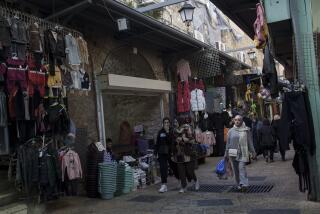Jerusalem Is Prize in Game of Cat-and-Mouse : Mideast: Israelis are incensed that Palestinian minister ‘secretly’ visited the holy city, which each side claims as its capital.
- Share via
JERUSALEM — This holy city--always the emotional heart of the Arab-Israeli conflict--has become the setting for a recent, elaborate, high-stakes cat-and-mouse game between Israelis and Palestinians.
Palestinian officials are playing the mice, scurrying in and out of Jerusalem, trying to force the Israelis to put discussions of sovereignty on the table. The Israelis are the increasingly frustrated, angry cats.
Both sides believe their every move may determine the ultimate status of a city each claims as its capital.
The game is played in rhetoric and deed. It came close to theater of the absurd this week, with the revelation by outraged Israeli officials that a senior Palestinian official had “secretly” visited Al Aqsa mosque on Wednesday.
Neither side is laughing.
Even as Yasser Abed-Rabbo, minister of information in the Palestinian Authority, made his unauthorized visit that so incensed the Israeli government, Jordan’s King Hussein flew over the city for the first time since the Jordanian loss of Jerusalem in the 1967 Middle East War.
The king’s move was welcomed here as further evidence of Jordan’s willingness to make peace. Abed-Rabbo’s gesture was denounced in a formal statement by Moshe Shahal, the Israeli police minister, as not in keeping with conduct appropriate to a Palestinian minister.
*
Israel insists it has the right to say when and where Palestinian ministers may travel inside Israel; it considers all of Jerusalem part of Israel. “There is no question of whether or not they are allowed to visit,” Shahal said. “The question is of prior coordination and acting according to agreements.”
Jerusalem Mayor Ehud Olmert was more blunt, saying of Abed-Rabbo’s visit: “This was done clearly and with prior planning as a provocation, which is aimed to serve specific public relations purposes and to give some sort of political expression and to get reactions both among us and the Palestinian public. In a situation like this, to create provocations around the Temple Mount, this is playing with fire.”
For the Israelis, the difference between Hussein’s interest and that of the Palestinians is clear and crucial.
The king, who claims the Prophet Mohammed as a direct ancestor, has taken to saying recently that only God should be sovereign over Jerusalem’s holy sites. Israel took that to mean that he was willing to allow Israel to exercise political sovereignty over the city, so long as Muslims were granted “sovereignty” over Temple Mount in the walled Old City.
PLO Chairman Yasser Arafat, in contrast, insists that someday Jerusalem will be the capital of a future Palestinian state. Israel has not yet agreed to a Palestinian state, let alone to sharing political sovereignty over Jerusalem. And it has not agreed to an Arafat visit to Jerusalem. By tacit agreement, he has not yet asked to come; Israel has not invited him.
“It is a gentlemen’s agreement,” said Uri Dromi, an Israeli government spokesman. “It reflects the sober understanding of both sides that a visit by Arafat would be something more than a religious pilgrimage to the mosque and that it could trigger a lot of public unrest on both sides.”
But Arafat, who heads the Palestinian Authority, feels that Israel violated its accord with him over Jerusalem by acknowledging a role here for Hussein.
Prime Minister Yitzhak Rabin included a clause on Jerusalem in the declaration he signed July 25 in Washington with the king, ending the state of war between Israel and Jordan. The language recognizes Jordan’s role in maintaining Muslim holy sites in the city, stating: “Israel respects the present special role of the Hashemite Kingdom of Jordan in Muslim holy shrines in Jerusalem. When negotiations on the permanent status will take place, Israel will give high priority to the Jordanian historic role in these shrines.”
But this statement also raised hackles among Israeli rightists, who said it opened the door to Israel negotiating away sovereignty over all of Jerusalem. It infuriated the Palestinians, who said Jordan has no role to play in Jerusalem’s future status.
*
Arafat last week demanded immediate talks with Israel on the future of Jerusalem--a demand instantly rejected by Israel. Israeli officials noted that the agreement Israel and the Palestine Liberation Organization signed in September calls for talks on Jerusalem to begin in the final stages of Israeli-Palestinian negotiations--no later than 1996.
And so the tug of war continues.
Ahmed Suleiman Khoury, the Palestinian who secretly negotiated the agreement with Israel that set the framework for Palestinian autonomy, was not allowed to attend an economics conference in Jerusalem.
Nabil Shaath, the Palestinian minister for planning and foreign relations, who this week traveled to Tel Aviv for talks with Shahal, was granted permission to go to Jerusalem. But it was revoked at the last minute.
The Palestinians announced that Intisar Wazir, minister of social affairs, prayed at Al Aqsa mosque before Abed-Rabbo. Israeli officials said her visit also was unauthorized.
And the Israelis continue to deny the Palestinians the chance to conduct any official business of the self-governing areas from Jerusalem.
Although Israeli officials met this week in Jerusalem with Palestinian officials to discuss economic cooperation, Israel will not allow the Palestinian Economic Council for Development and Reconstruction to have telephones.
Instead, officials of that agency, which is supposed to distribute money to the self-governing authority from the World Bank and donor countries, must use cellular telephones. Why? Their office is within Jerusalem’s municipal boundaries.
More to Read
Sign up for Essential California
The most important California stories and recommendations in your inbox every morning.
You may occasionally receive promotional content from the Los Angeles Times.













